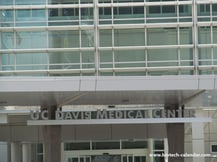The National Institutes of Health (NIH) awards the University of Arizona roughly 200 grants totaling about $100 million each year. In 2018 the numbers increased to 266 grants totaling $125,091,695. A large portion of this NIH research funding was awarded to the over 250 scientists included in the University's BIO5 Institute. Here are the top 10 BIO5 NIH grant recipients:
Read MoreTags: biomedical research, Biotech Event, Alzheimer's Research, UAZ, Research Funding, NIH funding, NIH grant, University of Arizona Tucson, UA, cancer research funding, cancer research grant, Asthma research, BioResearch Product Faire™, Cancer Diagnostics, cytomegalovirus, Valley Fever, virus research, BIO5 Institute
An estimated 15 million Americans will develop Alzheimer’s disease by 2060, according to researchers at the UCLA Fielding School of Public Health. The December 2017 study is the first of its kind to estimate the numbers of Americans with preclinical Alzheimer’s disease.

Tags: CA, UCLA School of Public Health, new research funding, Alzheimer's Research, LAVS, UCLA, Biotechnology Vendor Showcase, NIH funding, Alzheimer's research market, UCLA research funding, cytomegalovirus, Geriatrics
For the 2016 fiscal year budget, and Congress increased government funding on research for Alzheimer's by $350 million. That was a 50% increase over the previous year. The Alzheimer’s Association estimates that the National Institutes of Health would need $2 billion a year to maximize the chances of curing or preventing the disease by 2025. This year’s increase puts the NIH on track to reach that goal. Alzheimer's Disease is the most common form of dementia and this increased science research funding it is already beginning to pay off.
Read MoreTags: biomedical sciences, Bioresearch funding, Alzheimer's Research, Alzheimer' Research, Rutgers University, Rutgers, BioResearch Product Faire, dementia research, Biotechnology trade show
The Human Computation Institute, in collaboration with UC Berkeley and other institutions, has developed a new game called Stall Catchers that will allow the public to directly contribute to research for a cure to Alzheimer's disease. In the online game, participants will view movies of real blood vessels in mouse brains and search for any clogged capillaries, or stalls. Capillary stalls, where blood is no longer flowing, are thought to be a key cause of Alzheimer's disease.
Read More
Tags: CA, University of California Berkeley, California, University of California, Alzheimer's Research, Southwest Region, UC Berkeley, Northern California BioResearch, Alzheimer's Disease
In 2014, the Wisconsin Alzheimer's Disease Research Center received a five-year grant from the NIH totalling $7.5M dollars. The center was the first of its kind, created in 2009, and has provided a focused place of research on Alzheimer's diagnosis and treatment. With funding through March of 2019, the center is moving forward, with one recent publication indicating a panel of biomarkers that have been linked with Alzheimer's.
Read MoreTags: Wisconsin, University of Wisconsin, University of Wisconsin Madison, UWisc, Alzheimer's Research, Alzheimer's, Madison, 2016
 Neuroscience is an ever-expanding life science field. There is so much still unknown about the brain and diseases that affect it, and scientists are constantly performing research and publishing new findings. Diseases such as Alzheimer's, which affects memory and causes behavioral problems, are continually being investigated with the ultimate goal of finding a cure and creating new treatment methods. Recently, a team of researchers found a connection between the memory loss associated with Alzheimer's Disease and certain inflammatory cells in the brain.
Neuroscience is an ever-expanding life science field. There is so much still unknown about the brain and diseases that affect it, and scientists are constantly performing research and publishing new findings. Diseases such as Alzheimer's, which affects memory and causes behavioral problems, are continually being investigated with the ultimate goal of finding a cure and creating new treatment methods. Recently, a team of researchers found a connection between the memory loss associated with Alzheimer's Disease and certain inflammatory cells in the brain.
Tags: CA, Southwest, Alzheimer's Research, Neuroscience, Irvine, BRPF, UCI, UC Irvine, 2016, BioResearch Product Faire, Alzheimer's Disease, Inflammatory Cells, West Coast, Microglia
Tags: University of Pittsburgh, Pennsylvania, Northeast, UPITT, Alzheimer's Research, PA, new funding, 2016, BioResearch Product Faire, amyloid-beta proteins
Tags: CA, University of California Davis Medical Center, Southwest, Alzheimer's Research, UCDMC, BioResearch Product Faire Event, Sacramento, 2016
University of Arizona, Tucson doctoral student Sara Parker, alongside her adviser Sourav Ghosh (assistant professor of cellular and molecular medicine), have shed light on an unknown mechanism responsible for establishing polarity in developing nerve cells. This research, receiving life science funding from the National Institute of Health and Achievement Rewards for College Scientists Foundation, Inc. (awarded to Sara Parker), is allowing these scientists to understand how nerve cells make connections in the body.
Tags: 2014, 2013, University of Arizona, Southwest, Alzheimer's Research, Arizona, AZ, UAZ, BioResearch Product Faire Event, Front Line event, Front Line, Tucson, University of Arizona Tucson
“As many as 5 million Americans face the challenge of Alzheimer’s disease, which robs them of their memories, their independence, and ultimately, their lives. We are determined, even in a time of constrained fiscal resources, to capitalize on exciting scientific opportunities to advance understanding of Alzheimer’s biology and find effective therapies as quickly as possible.”
Tags: 2014, CA, University of Southern California, Southwest, California, USC, Los Angeles, Alzheimer's Research, Alzheimer's, BioResearch Product Faire Event, NIH funding



